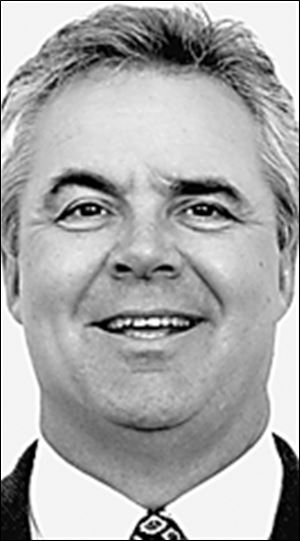
'Cradle Protestant' finds fulfillment in Catholicism
1/22/2005
Grodi
When Marcus Grodi left Perrysburg to attend Case Institute in Cleveland, he said he "left my faith behind - like a lot of young people do."
In his childhood, he had been active in church and social events at Zoar Lutheran, calling himself a "cradle Protestant."
But after a few years of studying genetics at Case, his science classes kept making him think about spiritual issues.
"It was during my junior and senior years, through my study of genetics, that I began to experience a reawakening," said Mr. Grodi, who returns to Perrysburg for a talk at St. Rose Catholic Church on Jan. 29.
His studies of the genetics of the eye convinced him that it was "absurd," he said, "to believe that the whole system of the eye and how we see could have somehow evolved through natural selection."
The deeper he delved into the genetics, the more he believed there must have been a loving creator responsible for the design of the eye, Mr. Grodi said in an interview from his home in Zanesville, Ohio.
Genetics research was "kind of the spark" that started him on his spiritual journey, he said, which has taken him from his ordination as a Protestant minister to conversion to Roman Catholicism.
He went on to found the Coming Home Network, which provides support to clergy and laypersons considering conversion to Catholicism, and is host of a weekly program on the Catholic cable station EWTN.
Mr. Grodi's first step upon graduation from Case (now Case-Western University) was to work as a plastics engineer for Dow Chemical Co.
But while working at Dow, he said, he felt a calling to the ministry. After four years as an engineer, he quit and enrolled at Gordon-Conwell Theological Seminary.
Mr. Grodi was ordained as a Congregationalist minister in 1980, and soon switched to the Presbyterian denomination and served at three churches in southern Ohio.
Once again, however, he felt a restlessness in his spirit.
"I wanted to be the best pastor that I could be, and I really desired to be faithful for Christ and to be able to stand before him one day without embarrassment and hear those famous words, 'Well done, my good and faithful servant,'●" Mr. Grodi said, referring to the commendation of Jesus from Matthew 25:21.
He started to doubt his own Christian beliefs, he said, and found it difficult to reconcile the diversity of interpretations among different groups of Protestants.
"Sometimes the opinions were only slightly different and weren't of great significance," Mr. Grodi said, "but others were big - the meaning of the sacraments, ordination, the necessity of the hierarchy of the church, whether every individual has the right to interpret scripture as they see fit."
While struggling with these issues, he said, he began to feel unqualified for the pulpit.
"Over a period of eight years, I was trying to assess whether what I was teaching was true. And I decided that if I wasn't certain, I had no right to be in the pulpit. People trust the pastor. The pastor is eternally responsible for what they teach others. If I couldn't discern whether I was right or the Assembly of God was right or the Episcopal Church was right, then I shouldn't be leading these people," he said.
"I decided the problem was me, not the church or the denomination."
Mr. Grodi resigned from the pastorate and returned to school, studying molecular biology at Case Western.
Through discussions with a friend, Scott Hahn, who had converted to Catholicism, Mr. Grodi began to study the roots of Protestantism and Catholicism. A year and a half later, after much research, discussions, and prayer, Mr. Grodi and his wife, Marilyn, and their two teenage sons converted to Catholicism (the couple's third son, Richard, was baptized into the church as an infant in 1995).
His switch to the Roman Catholic faith was made through two phases, he said. First was an examination of Protestantism, and second was research into Catholicism.
He lost confidence in the Protestant tradition when he came to believe that solo scriptura, or "the Bible alone," was unscriptural, he said, citing the biblical text in I Timothy 3:15 that calls the church "the pillar and foundation of truth."
"If it's the church, not the Bible, then how can you find a church you can trust?" Mr. Grodi asked. "I began to study history, which led me to read about early church fathers, and the more I read, the more I discovered the Catholic Church. I was amazed at how much I missed in my own seminary education."
Today, Mr. Grodi, 52, leads the Coming Home Network, a nonprofit organization that seeks to answer the same kinds of questions he encountered on his journey to Catholicism.
In its 10 years of existence, the network has worked with 1,000 Protestant ministers from 60 denominations, he said, about 600 of whom converted to Catholicism.
Mr. Grodi's efforts with the Coming Home Network opened the doors for him to appear as a guest on EWTN in December, 1996, and he later was offered his own program. He flies from Ohio to Alabama every week to host a live broadcast of The Journey Home.
"After I converted to the Catholic Church, I thought, 'What am I going to do?'●" Mr. Grodi said. "I'm married with children, and it's hard to go back to the pastorate. But it's neat how God opened up doors and continues to open up doors for me after I became Catholic."
Marcus Grodi will discuss his conversion story at 7 p.m. Jan. 29 at St. Rose Catholic Church, 215 East Front St., Perrysburg. A free-will offering will be taken. For information, call the church office, 419-874-4559.